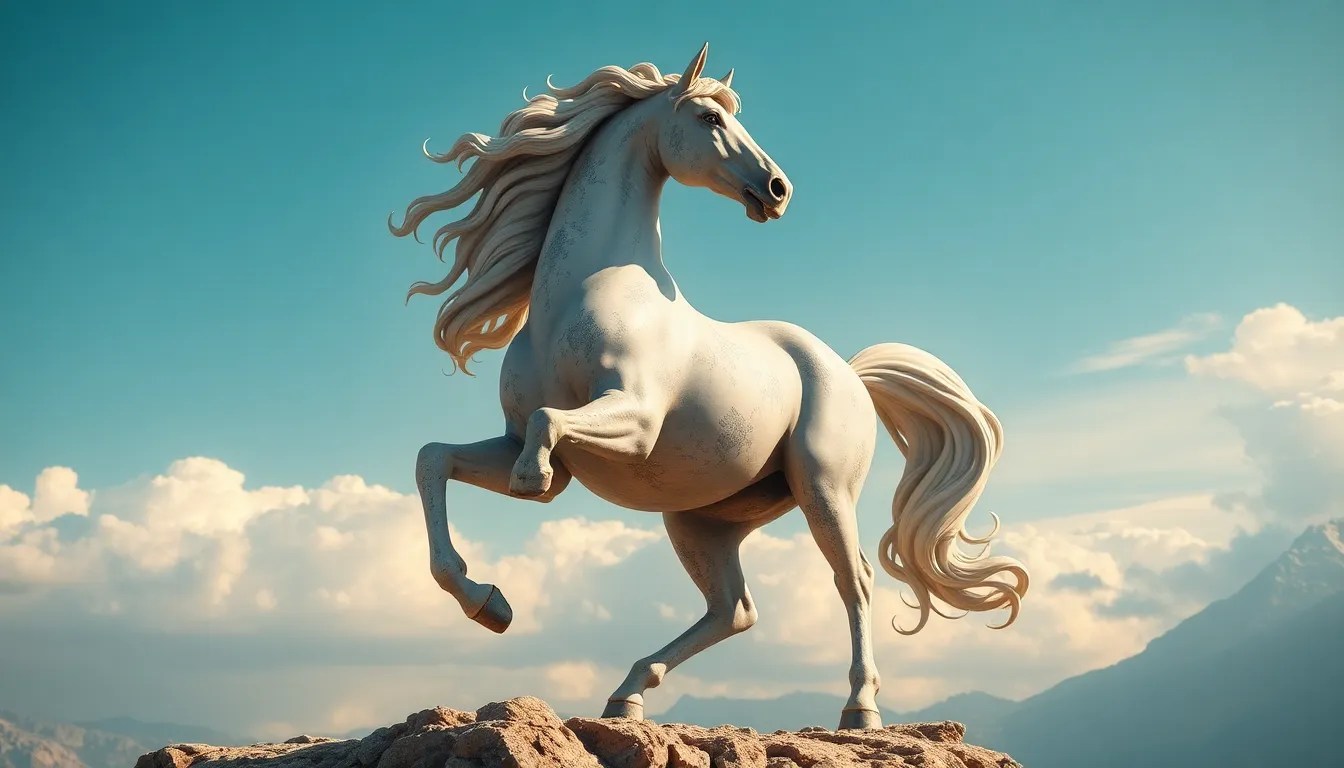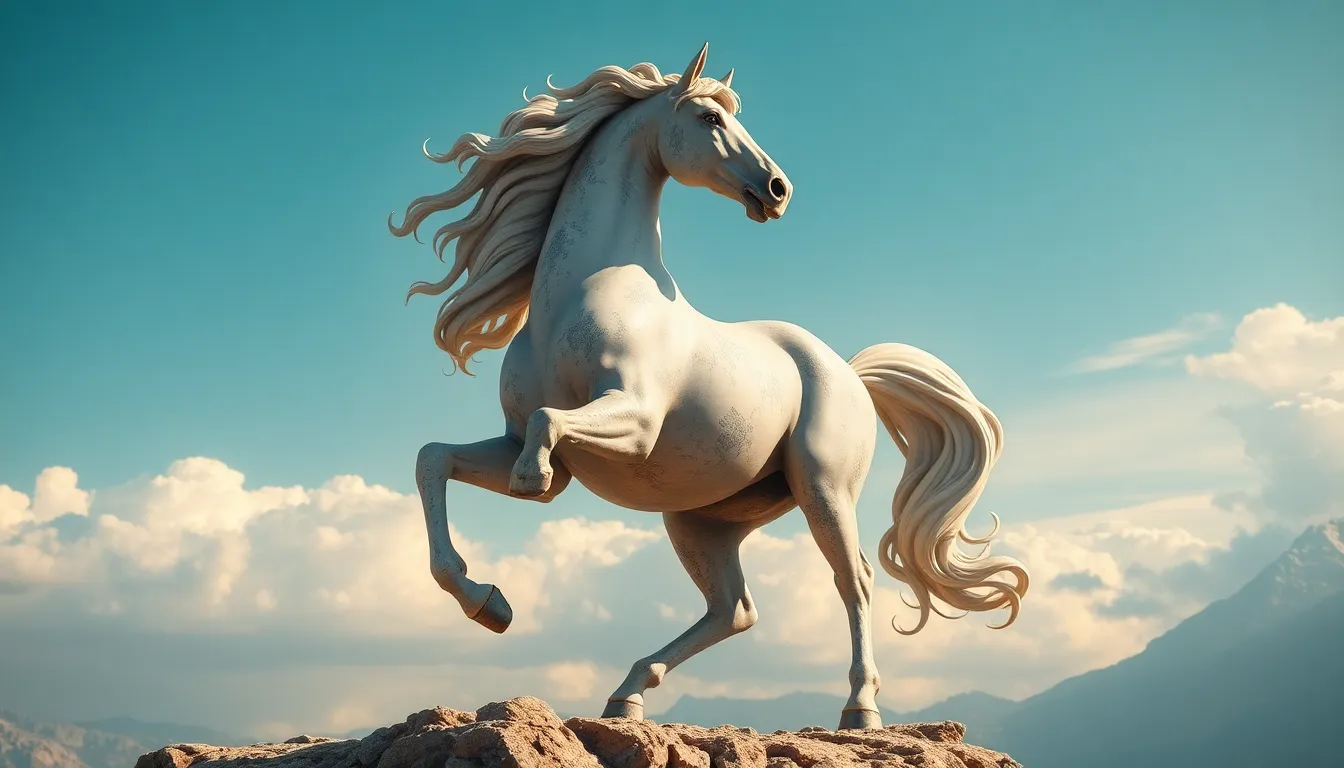The Role of the Horse in Greek Mythology: A Symbol of Freedom and Power
I. Introduction
The horse holds a special place in ancient Greek culture, symbolizing both freedom and power. From the fields of battle to the realms of myth, horses were revered not only for their physical prowess but also for their deep connection to the divine and the heroic. This article will explore the multifaceted role of the horse in Greek mythology, delving into its significance as a symbol of liberation and strength.
By examining historical context, mythological representations, and cultural artifacts, we aim to uncover the profound impact horses had on Greek society and how their legacy continues to resonate today.
II. Historical Context: Horses in Ancient Greece
The domestication of horses marked a pivotal moment in ancient Greek society, transforming various aspects of life, including warfare, agriculture, and transportation. The Greeks recognized the immense value of horses, integrating them into their daily lives and spiritual beliefs.
A. The domestication and use of horses in Greek society
Horses were first domesticated around 4000 BC, but their widespread use in Greece began around the 9th century BC. They were primarily utilized for:
- Agricultural work, such as plowing fields
- Transporting goods and people
- Military purposes, including cavalry units
This domestication led to a significant shift in societal structure, as the possession of horses became a symbol of wealth and status.
B. The role of horses in warfare and transportation
In warfare, horses were invaluable. Chariots, often pulled by teams of horses, revolutionized combat strategies. The Greeks utilized horses in various forms of warfare, including cavalry charges that could break enemy lines. The famous battles of the ancient world often featured cavalry as a decisive factor.
C. The cultural importance of equestrian events and competitions
Equestrian events were central to Greek culture, with the Olympic Games including chariot racing as one of its premier events. These competitions not only celebrated athleticism but also showcased the skill of horsemen and the beauty of their steeds. The following events were commonly held:
- Chariot races
- Horse races
- Equestrian displays
Such events highlighted the bond between humans and horses, further embedding the animal into the cultural fabric of Greece.
III. Mythological Representations of Horses
In Greek mythology, horses are often depicted as powerful beings with divine connections. They appear in various stories, emphasizing their significance in both mortal and immortal realms.
A. Key mythological figures associated with horses (e.g., Poseidon, Pegasus)
Several deities and mythical creatures are closely linked to horses:
- Poseidon: The god of the sea, earthquakes, and horses, Poseidon was credited with creating the first horse. He is often depicted riding a chariot drawn by magnificent horses.
- Pegasus: The winged horse born from the blood of Medusa, Pegasus symbolizes poetic inspiration and the transcendence of human limitations.
- Hippolytus: The son of Theseus, Hippolytus was a devoted follower of Artemis and known for his exceptional skill in horsemanship.
B. Symbolism of horses in myths and legends
Horses in Greek mythology often symbolize strength, freedom, and transformation. They are frequently associated with the divine, representing the bridge between the mortal and immortal worlds. The relationship between gods and horses illustrates themes of control, power, and the balance of nature.
C. Stories illustrating the bond between horses and gods
One notable myth involves the Trojan War, where the Greeks used the cunning of Odysseus to create the Trojan Horse, a symbol of deception that ultimately led to victory. This tale showcases the strategic importance of horses not only in physical combat but also in the art of war.
IV. The Horse as a Symbol of Power
Throughout history, horses have represented authority and status. Their presence in warfare and art signifies a connection between power and the equestrian world.
A. Horses in warfare: chariots and cavalry
The use of horses in battle, especially in the form of chariots and cavalry, exemplified military might. Chariots, often elaborately decorated, became symbols of prestige among rulers and generals.
B. Representations of authority and status in Greek art and literature
Greek art frequently portrays horses as symbols of wealth and power. Notable representations include:
- Vases depicting chariot races
- Sculptures of gods with horses
- Literary references in epic poems, such as Homer’s “Iliad” and “Odyssey”
These artistic forms reflect how integral horses were to the identity of powerful figures in ancient Greece.
C. The horse as a divine gift and its implications for power dynamics
In many myths, horses are portrayed as divine gifts, granted by gods to favored mortals. This relationship highlights the divine endorsement of certain individuals, reinforcing their status within society. For example, the gift of horses might elevate a warrior’s reputation, enhancing their power and influence.
V. The Horse as a Symbol of Freedom
While horses represent power, they also embody freedom. Their ability to roam vast landscapes and their role in liberating heroes in myths showcase this duality.
A. Horses as representations of personal and societal freedom
In Greek mythology, horses often symbolize the spirit of freedom. Characters such as Bellerophon, who rode Pegasus, exemplify the idea of soaring beyond earthly constraints, representing personal liberation.
B. The role of horses in Greek mythology as liberators
Horses have played critical roles in various myths where they serve as liberators. For instance, the centaur Chiron, known for his wisdom and healing abilities, represents the wild, untamed aspect of nature, advocating for freedom of spirit.
C. Contrast between the wild horse and the domesticated horse
The dichotomy of the wild horse versus the domesticated horse illustrates the tension between freedom and control. Wild horses symbolize untamed nature and independence, while domesticated horses represent human control and societal order. This contrast is a recurring theme in Greek mythology, reflecting the complexities of freedom.
VI. Cultural Artifacts and Representations
The significance of horses in Greek culture is evident through various artifacts, including pottery, sculptures, and frescoes. These works provide insights into how horses were viewed in ancient society.
A. Analysis of pottery, sculptures, and frescoes featuring horses
Many Greek pottery pieces depict equestrian scenes, showcasing horses in both competitive and mythological contexts. Notable examples include:
- Black-figure vases illustrating chariot races
- Red-figure pottery depicting mythological tales involving horses
- Sculptures of horses in temples dedicated to Poseidon
B. The horse in Greek literature and poetry
Literature from ancient Greece frequently references horses, symbolizing nobility and valor. Epic poems like the “Iliad” and “Odyssey” celebrate the heroic deeds of horsemen, illustrating the deep connection between horses and heroic ideals.
C. How these artifacts reflect the dual symbolism of horses
Through these artifacts, we see the dual symbolism of horses as both powerful beings and symbols of freedom. They bridge the gap between the mortal and divine, embodying the complexities of human experience in Greek mythology.
VII. The Legacy of Horses in Greek Mythology
The influence of horses in Greek mythology extends beyond ancient Greece, impacting later cultures and mythologies. Their symbolism continues to resonate in modern contexts, emphasizing themes of freedom and power.
A. Influence on later cultures and mythologies
Horses have retained their significance in various cultures throughout history. From the Roman Empire to modern equestrian societies, the legacy of Greek equestrianism can be seen in:
- The depiction of horses in Roman art and literature
- The continued popularity of equestrian events in modern sports
- Horses as symbols of freedom in contemporary art and





